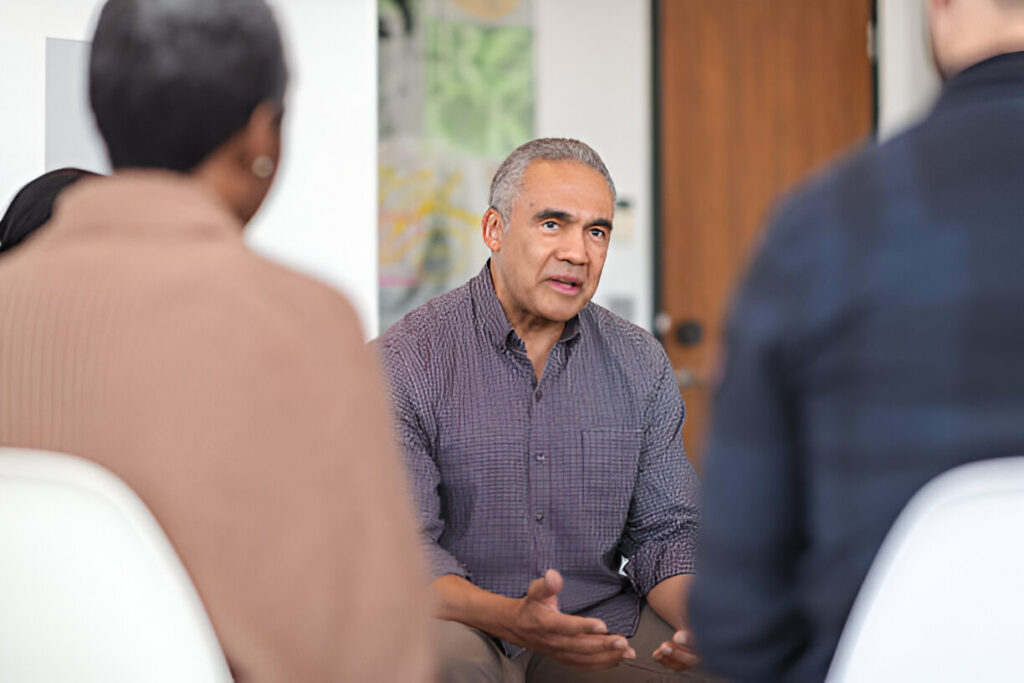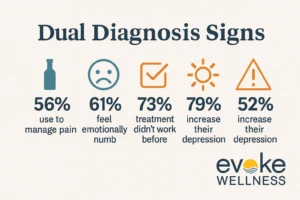You’re not imagining it.
The person you love is still there—but harder to reach. They’re drinking more, or using again. They’re pulling away, or maybe cycling through moods that don’t quite match the circumstances. You’ve asked yourself, “Is this addiction? Is it depression? Is it both?”
If you’re asking those kinds of questions, you’re not overreacting. You’re doing what someone who loves deeply does—trying to make sense of pain you can’t fix.
At Evoke Wellness TX in San Marcos, we work with partners like you all the time—people stuck in a hard tension: loving someone who’s actively using, while wondering if more is going on under the surface. This blog will help you understand what dual diagnosis treatment is, how to spot the signs, and how to move forward with compassion—for both of you.
What Is Dual Diagnosis Treatment?
Dual diagnosis—also called co-occurring disorders—means that someone is living with both a mental health disorder and a substance use disorder at the same time.
It’s incredibly common. In fact, the National Institute on Drug Abuse estimates that more than half of people with substance use disorders also have a co-occurring mental health condition.
But here’s what’s less commonly understood: these issues don’t just “exist together.” They interact in ways that make both worse.
That’s why dual diagnosis treatment matters. It treats both, together.
At Evoke TX, dual diagnosis care means your loved one’s substance use and mental health symptoms aren’t being treated in silos. Instead, they’re understood as deeply connected, and we use integrated care to help them heal fully—not halfway.
What Are the Signs My Partner Might Need Dual Diagnosis Care?
You don’t need to be a clinician to notice when something deeper is happening. You live with this person. You love them. You’ve seen what others don’t.
Here are some signs that dual diagnosis treatment may be the right step:
They use substances to manage their emotions—not just escape.
Does your partner reach for alcohol, weed, or pills not just to “unwind” but to feel okay? Maybe they drink because they can’t sleep, or use because they can’t face the day. That kind of self-medicating often points to an underlying emotional or psychological issue.
Their moods shift unpredictably—even when they’re not using.
Substance use can cause mood swings, yes. But if your partner shows symptoms of depression, anxiety, or agitation that persist outside of using, it’s a red flag. If sobriety doesn’t bring stability, it may be more than addiction.
They’ve tried treatment before—but it didn’t stick.
Many people cycle in and out of detox or rehab because traditional addiction programs don’t address the root cause. If your partner sobered up but quickly relapsed—or if they left treatment feeling worse—it might be because the mental health side wasn’t being addressed.
They seem emotionally numb, distant, or “not themselves.”
You might hear them say things like “I don’t care anymore,” or “I’m just tired of everything.” Or they might just stop engaging, pulling away from friends, family, or passions. That emotional flatness can be a sign of depression or trauma.
Their mental health gets worse when they try to stop using.
This is a big one. If your partner gets more anxious, angry, or overwhelmed during periods of sobriety, it could be that substances were masking untreated mental illness. Once those coping tools are removed, the pain comes roaring back.
Can I Really Be the One to Spot This?
Yes—and it doesn’t make you responsible for it.
You’re not a therapist, but you are someone who sees the full picture. You notice the patterns: the time of day they start drinking, the crash that comes after a high, the look in their eyes when they say they’re “fine” but aren’t.
You’re also probably one of the only people they haven’t fully pushed away—yet.
Your concern matters. And your instincts are probably more accurate than you’ve been told.
Still, it’s not your job to diagnose. It’s your job to care with clarity—and maybe help connect them to someone who can evaluate what’s going on fully.
What Does Dual Diagnosis Treatment Look Like?
At Evoke Wellness TX, dual diagnosis treatment is rooted in integrated, trauma-informed care. That means:
- A full diagnostic assessment—not just for addiction, but for mood disorders, anxiety, trauma, and more.
- Therapists and medical professionals who work together, not in silos.
- Group and individual therapy, focused on both emotional health and addiction recovery.
- Medication management, when appropriate, to stabilize mood and reduce relapse risk.
- Family therapy and support, because addiction doesn’t happen in isolation—and neither does healing.
Dual diagnosis treatment isn’t “harder” or “more serious.” It’s just more complete. It meets people where they actually are—not where they’re supposed to be.
What If My Partner Doesn’t Believe They Need Help?
This is one of the hardest parts of loving someone in pain.
They might say they’re “just stressed.” That therapy is pointless. That they’re not drinking that much. That you’re being dramatic.
Sometimes they don’t want help because they’re scared of what treatment will reveal. Other times, the substances are still working well enough to numb the fear.
Here’s what you can do:
- Stay honest and grounded. Say what you see, not what you fear. Try: “I see you hurting. I don’t know exactly what’s going on, but I want you to feel better.”
- Avoid ultimatums. Instead, invite curiosity. “What if this is more than just the drinking? What if something else is going on underneath?”
- Have information ready. Share resources without pressure. Let them see that treatment doesn’t have to mean punishment—it can mean relief.
- Get support for yourself. You can’t make someone get help. But you can keep your own sanity and stability by connecting with a counselor, support group, or therapist.
Is It My Fault for Not Noticing Sooner?
Not even close.
Dual diagnosis can look like addiction. It can look like depression. It can look like laziness, detachment, selfishness, or disconnection.
You’ve probably spent a lot of time trying to make sense of their pain and protect your relationship at the same time. That’s not denial. That’s survival.
Noticing it now doesn’t mean you “missed” something. It means you’re paying attention—and ready to take a step toward healing.
What If I Want to Help But I’m Completely Burned Out?
You are not a failure for feeling depleted.
Living with someone who is actively using—and possibly mentally unwell—takes a toll. You might feel like the caregiver, the referee, the financial safety net, the emotional regulator… and the only one holding it all together.
You’re allowed to step back without walking away. You’re allowed to draw boundaries without abandoning them. You’re allowed to want peace in your home.
Helping doesn’t mean fixing. It means walking with—and sometimes letting professionals take over where love can’t reach.
What’s the First Step?
Start with a conversation—with your partner, if possible, but also with someone trained to help.
You can call our admissions team at Evoke Wellness TX just to ask questions. No pressure. No obligation. We’ll talk you through what dual diagnosis treatment looks like, what options might fit, and how to navigate it as a loved one.
Call (888)450-2285 or visit our Dual Diagnosis Treatment Program in San Marcos, Texas when you’re ready to get real answers, not more guesses. You don’t have to fix this alone. And neither does your partner.



